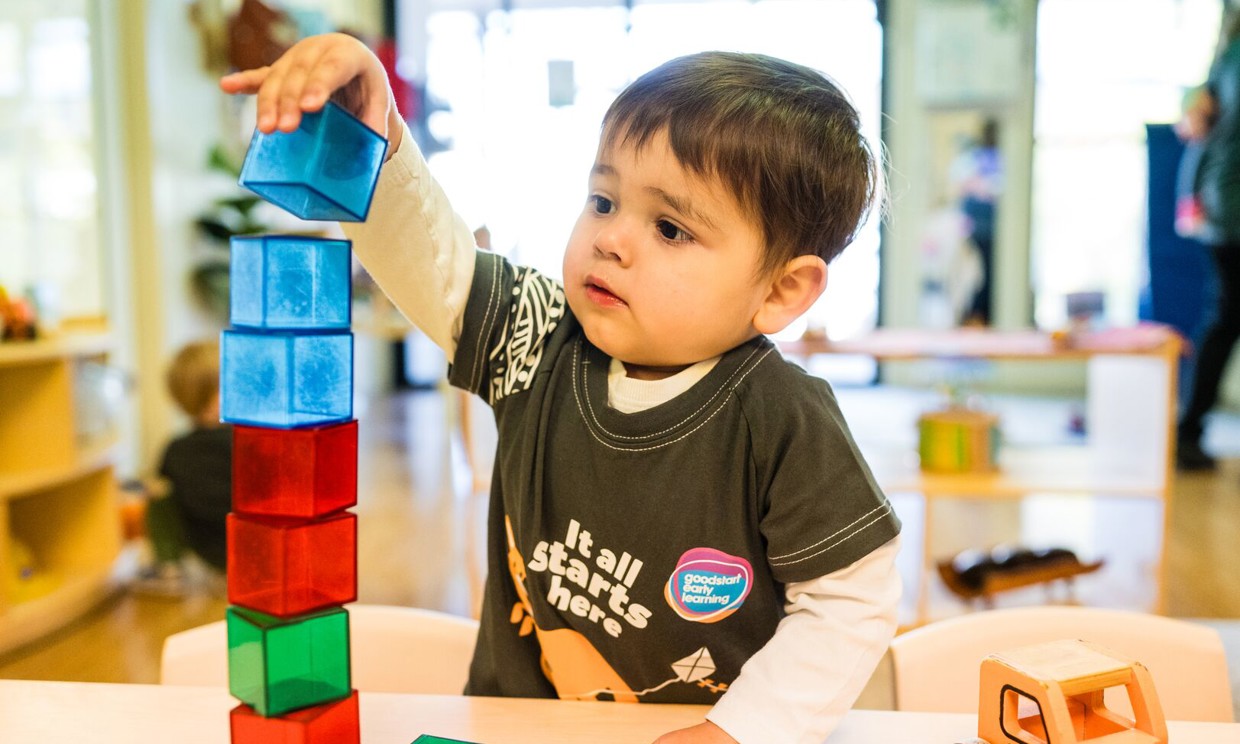When you hear the term play-based learning, you might picture kids having fun – and you'd be right. But there's a lot more beneath the surface.
For children, play is a natural process of inquiry and discovery through which they imagine, problem-solve, and develop the social and emotional skills that set them up for success in school and life.
When children play, it can look like they're simply having fun – building a tower, pretending to be a shopkeeper, digging in the garden, or drawing a treasure map.
What's really happening is powerful, complex learning.
Through play, children explore, negotiate, take risks, and create meaning. They're learning to think, connect ideas, communicate and regulate their feelings. These are all important components of learning that assist children in their interactions today and into the future.
Play-based learning is central to Australia's Early Years Learning Framework (EYLF), which guides how early childhood education supports the development of confident and engaged learners.
It's a model that celebrates the fact that children learn best when they're curious and actively involved, rather than passively receiving information.
At Goodstart, our nursery, toddler, and preschool kindergarten education programs are based on play-based learning.
The science behind the fun
Play-based learning is not about letting children do whatever they like; it's a thoughtful, intentional way of teaching that builds on their natural interests and curiosity.
Educators design tailored learning experiences within play-like experiences that help children explore literacy, numeracy, science, creativity, and social understanding in ways that feel natural and enjoyable.
Research consistently shows this approach works. Studies over the past decade – and a 2025 global meta-analysis of play-based learning encompassing more than 80 studies – have found that play enhances children's academic outcomes, motivation, problem-solving skills, and social-emotional skills.*
When children are actively engaged and having fun, their brains are more open to learning and more likely to retain new information.
Importantly, play helps develop what psychologists call 'executive function': the mental processes that allow children to plan, focus attention, remember instructions and juggle multiple tasks. These abilities are directly linked to success later in school and in life.
What play-based learning looks like
 Play helps develop executive function: the mental processes that allow children to plan, focus attention, remember instructions and juggle multiple tasks
Play helps develop executive function: the mental processes that allow children to plan, focus attention, remember instructions and juggle multiple tasks
In a quality early learning environment, play is the vehicle for deep learning.
Skilled educators know each child's strengths, interests and learning style, and use that knowledge to create opportunities for discovery.
A child fascinated by dinosaurs might be encouraged to compare and classify them, developing early mathematics and language skills.
A group tending to a veggie garden could record how the plants change each week, exploring measurement, pattern, time and scientific process – understanding the natural world.
Children playing 'restaurant' might write menus, take orders, count money and serve food, building literacy and numeracy without even realising it. They'll also build their vocabulary with new words, which is essential for future success in reading, writing, and spelling.
Even simple activities have multiple layers of learning:
- A puzzle builds persistence, pattern recognition, fine motor skills and spatial reasoning.
- Building a tower becomes an early lesson in physics, emphasising balance and stability.
- Outdoor play develops coordination, spatial awareness and risk assessment while offering rich opportunities for imagination and social connection.
The educator's role is key. They observe children closely, plan environments and experiences that extend learning, and gently guide the play with open-ended questions such as 'What do you think will happen if we add water to the sand?' or 'How could we make that tower taller?' This kind of questioning sparks curiosity and encourages children to think critically and creatively.
This is what we mean by 'child-led' or 'tailored' play-based learning programs.
Making learning visible
At Goodstart, educators observe and conduct assessments on children's learning and development, helping to understand their current ability and next learning steps. This documentation helps make learning visible – showing children, families, and educators exactly how skills are developing through play.
It also allows educators to tailor each child's learning program, ensuring that every experience connects to their interests, strengths and next steps.
Parents play an essential part. When families share what children are doing and learning at home – perhaps a new interest in cooking, building or gardening – educators can build on those experiences in the centre.
This continuity between home and early learning strengthens understanding and helps children see that learning happens everywhere.
Why it matters
There's a growing body of evidence that children in play-based programs show stronger language and social skills, greater creativity and higher levels of wellbeing.**
Play builds resilience – the ability to cope with setbacks and keep trying – as well as empathy and cooperation.
It also helps children become motivated, self-directed learners who take ownership of their ideas.
In simple terms, play-based learning supports:
- Cognitive development – problem-solving, memory, attention and flexible thinking
- Social and emotional growth – teamwork, empathy, confidence and self-regulation
- Language and communication – storytelling, vocabulary, expression and listening
- Physical development – coordination, balance and fine motor control
- Creativity and curiosity – the building blocks of innovation and lifelong learning.
Play-based learning isn't about avoiding structure or outcomes; it's about achieving them through meaningful engagement.
When children are genuinely interested in what they're doing, they learn deeply and joyfully.
They're not just memorising facts – they're developing the capacity to think, imagine, question and collaborate.
How you can support play-based learning at home
 You can offer open-ended materials, provide challenges, and spend time outdoors - following your child's lead
You can offer open-ended materials, provide challenges, and spend time outdoors - following your child's lead
Parents and carers can help by creating space for play and following their child's lead.
Offer open-ended materials, such as blocks, boxes, natural objects, and dress-ups, or mark-making tools like pencils, paper, crayons, and chalk, and let children decide what to create or explore.
You can gently extend their play by asking questions or providing new challenges, such as measuring ingredients when cooking together or guessing how many steps it will take to reach the letterbox.
Outdoor play is especially valuable. Research shows that spending time in nature enhances cognitive development, reduces stress and improves concentration. Whether it's a backyard, a local park or a beach, unstructured outdoor play invites creativity, exploration and problem-solving.
Most importantly, remember that play is not the opposite of learning – it is a form of learning.
When children pretend, build, draw, experiment, sing, climb or question, they're developing essential skills for life.
A foundation for the future
Play-based learning prepares children not only for school, but also for life in a rapidly changing world.
It nurtures adaptability, curiosity and a love of learning that will stay with them long after they leave early childhood.
By engaging their minds, hearts and hands, play builds the foundation for confident, capable, compassionate people.
At Goodstart, every educator is committed to making that happen. Through thoughtful and intentional play, we support children in exploring their world, discovering their abilities, and developing into active, lifelong learners.
So next time you see your child deep in play – building, imagining, talking or experimenting – take a moment to watch closely. You'll be seeing learning in action.
Explore careers at Goodstart or find your nearest centre.
*Dean & Wenner (2025) 'Patterns and representation in play-based learning: a systematic meta-synthesis of empirical studies in K-13+ settings' in Frontiers in Education – they reviewed 1,475 studies, found 87 meeting strict criteria, and conclude that play-based learning supports academic skills, problem-solving and social-emotional growth. frontiersin.org+1
**American Academy of Pediatrics – 'The Power of Play: A Pediatric Role in Enhancing Development in Young Children' explains that developmentally appropriate play promotes children's social-emotional, cognitive, language and self-regulation skills. Pediatrics Publications
**Evidence for Learning (Australia) – In their toolkit, they note that play-based learning approaches produce positive outcomes for language, early literacy, early numeracy and other cognitive and social-emotional domains. E4L



